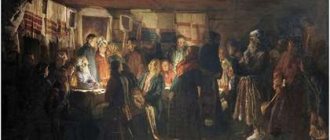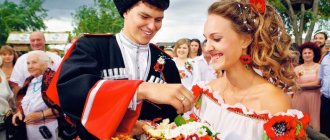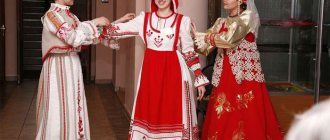Matchmaking: the purpose of the ceremony
A wedding is an important event in the life of any person.
And a traditional wedding is preceded by an equally important matchmaking ceremony. Unfortunately, in the modern world there is so little room for traditions. But it is in them that the soul of the people, their mentality is reflected. In ancient times, even strangers to the bride could send matchmakers; parents, in turn, could persuade her to marry if the groom, in their opinion, was suitable for their daughter. Therefore, during the matchmaking, the girl’s fate was practically decided. Nowadays, the matchmaking ceremony is formal, it is carried out either to meet the parents, or to discuss the details of the upcoming wedding. It even happens that they refuse this altogether, especially if the future husband and wife organize the wedding themselves.
Indirect blood relationship (through mother and father)
In one generation
Native
Fullbred, blood
- brothers and sisters (in relation to each other), descended from the same father and mother.
- Brother
is a boy/man in relation to another child(ren) of his parents[5].
An older brother
is a boy/man in relation to the younger child(ren) of his parents. - A younger brother
is a boy/man in relation to the older child(ren) of his parents. - A married brother
(
obsolete
) is a brother born before the marriage of his parents and recognized by them.
- a girl/woman in relation to another child (children) of her parents.
- An older sister
is a girl/woman in relation to the younger child(ren) of her parents.
is a girl/woman in relation to the older child(ren) of her parents.
(
obsolete
) is a sister born before the marriage of her parents and recognized by them.
are children of the same mother, developed during the same pregnancy.
There are identical twins (same sex and absolutely similar in appearance) and fraternal twins. Sometimes only identical brothers or sisters are called twins, in which case fraternal brothers and sisters are called twins
,
triplets
... depending on the number (two, three, etc.).
[6] (
sibs
[7]) is a general designation used mainly in scientific terminology for brothers and sisters (in relation to each other) descending from the same parents.
Half-blooded
- having only one common parent. In turn, half-brothers and sisters are divided into:
- Consanguineous
(
homogeneous
) - descended from the same father, but different mothers. - Monouterine
(
one-uterine
) - descended from the same mother, but different fathers.
Summary
Half-siblings
- children from previous marriages brought into one family, not related by any blood ties[8];
their position in the pedigree, social and legal status are classified as consanguinity
.
Direct family relations between half-brothers and sisters (and their descendants) will be regarded as characteristic
(see below) until their parents have common children - their
half-brothers
and
half
-brothers.
In this case, all brothers and sisters will become blood relatives through descendants: this is the only and rather interesting point in genealogy, since both the descendants of half-brothers and sisters, and the descendants of their common (half- and half-brothers) brothers and sisters will be related by blood by definition
- and with the parents of brothers and sisters (that is, through a generation), and with the brothers and sisters themselves, and among themselves, respectively.
Cousins
Cousins
:
- Cousin
(or
cousin
[9], from the French cousin), is a boy/man in relation to the child of an uncle and/or aunt, the son of an uncle or aunt. - A cousin
(or
cousin
, from the French cousine) is a girl/woman in relation to the child of an uncle and/or aunt, a daughter of an uncle and/or aunt.
It should be noted that the words “cousin” and “cousin” can be used in a broader sense than “cousins” - they also mean “a distant blood relative in the same generation as someone.”[9].
Second cousins
Second cousins
:
- Second cousin
- grandson of a brother or sister of a grandfather or grandmother; son of a great uncle or aunt. - Second cousin
- granddaughter of a brother or sister of a grandfather or grandmother; daughter of a great uncle or aunt.
Fourth cousins
Fourth cousins
, sometimes
quadruple
:
- A fourth cousin
is the great-grandson of a brother or sister of a great-grandfather or great-grandmother, the grandson of a second cousin of an grandfather or grandmother, the son of a second cousin of an uncle or aunt. - A fourth cousin
is the great-granddaughter of a brother or sister of a great-grandfather or great-grandmother, the granddaughter of a second cousin of a grandfather or grandmother, the daughter of a second cousin of an uncle or aunt.
Siblings have common parents, cousins have common grandparents, second cousins have common great-grandparents, fourth cousins have common great-great-grandparents, and so on.
From the fourth generation onwards, the number of “tribes” between relatives is usually indicated. For example: seven tribes are seven-tribe brothers, and so on.
In neighboring generations
Parent's siblings (and their spouses):
- Uncle
(
uncle
,
colloquial uncle
) - a man/boy in relation to the children of a brother or sister, a brother of a father or mother (an aunt’s husband is considered not a real uncle, but an uncle-in-law).
Stryi
(
strii
,
stroy
,
strytsa
) - (
obsolete
) paternal uncle (father's brother). - Uy
(
vui
) - (
obsolete
) maternal uncle (mother's brother).
(
aunt
,
decomposition aunty
) - a woman/girl in relation to the children of a brother or sister, a sister of a father or mother (an uncle’s wife is considered not a natural aunt, but an in-law aunt).
- Stryya
(
striya
,
strynya
,
stryna
) - (
obsolete
) paternal aunt (father's sister).
- (
obsolete
) maternal aunt (mother's sister).
Children of a brother or sister:
- Nephew
(
nephew
,
netiy
) - a boy/man in relation to an uncle or aunt, the son of a brother or sister.
Bratych
(
bratinich
,
bratelnich
,
sonovets
) - (
obsolete
) brother’s son, brother’s nephew[10]. - Bratanich
- (
obsolete
) nephew, son of an older brother.
The youngest son is a brother
. - Sister
(
sister
,
sister
,
sister
) - (
obsolete
) son of a sister, nephew by sister.
(
niece
,
Nester
) - a girl/woman in relation to an uncle or aunt, the daughter of a brother or sister.
- Bro
(
brotanna
,
bro
,
son
) - (
obsolete
) daughter of a brother, niece by brother.
(
sestrichna
) - (
obsolete
) sister’s daughter, sister’s niece.
Parent's cousins:
- Cousin
(
strictly small
) is a man/boy in relation to the children of a cousin, that is, a cousin of the father or mother. - A great aunt
is a woman/girl in relation to the children of a cousin, that is, a cousin of the father or mother.
Children of a cousin:
- Cousin
- a boy/male in relation to a great uncle or aunt, the son of a first cousin.
Dsherich
is his aunt's nephew.
- girl/woman in relation to a great uncle or aunt, daughter of a first cousin.
- Daughter
's aunt's niece.
| Mother | Father | Aunt Uncle) | Uncle Aunt) | ||||||||||||||||||||||||||||||
| N | Cousin (Cousin) | Cousin-in-law (cousin-in-law) | |||||||||||||||||||||||||||||||
| Great cousin (great niece) | |||||||||||||||||||||||||||||||||
Parent's second cousins:
- Second cousin
- a man/boy in relation to the children of a second cousin or second cousin, a second cousin of a father or mother, a husband of a second cousin. - Second cousin
- a woman/girl in relation to the children of a second cousin or second cousin, a second cousin of a father or mother, a wife of a second cousin.
Children of a second cousin:
- Second cousin
- a boy/male in relation to a second cousin, uncle or aunt, son of a second cousin. - Second cousin
- a girl/woman in relation to a second cousin or aunt, the daughter of a second cousin.
See also Nephew and Niece
A generation later
Siblings of grandparents:
- Great uncle
(obsolete
great uncle
) - a man in relation to the grandchildren of a brother or sister, brother of a grandfather or grandmother, uncle of a parent.
Strictly great
(
obsolete
) - the elder brother of a grandfather or grandmother, great-uncle. - Strictly small
(
obsolete
) - the younger brother of a grandfather or grandmother, great-uncle.
(obsolete
great aunt
) - a woman in relation to the grandchildren of a brother or sister, sister of a grandfather or grandmother, aunt of a parent.
is a boy/man in relation to a parent’s uncle or aunt, a grandson of a sibling, a son of a nephew, a cousin.
is a girl/woman in relation to a parent’s uncle or aunt, a granddaughter of a sibling, a daughter of a nephew, a first cousin.
| Grandfather | Grandmother | Great Uncle/Great Uncle (Great Aunt/Great Aunt) | |||||||||||||||||||||||||||||||||||
| Mother | Father | Great aunt (great uncle) | Great Uncle (Great Aunt) | ||||||||||||||||||||||||||||||||||
| N | Second cousin (second cousin) | ||||||||||||||||||||||||||||||||||||
Grandparents' cousins:
- A second cousin
is a male relative to the grandchildren of a first cousin, a first cousin of a grandfather or grandmother, a first cousin of a parent. - A second cousin
is a woman in relation to the grandchildren of a cousin, a cousin of a grandfather or grandmother, a great aunt of a parent. - Great-great-cousin
- a boy/man in relation to a parent's great uncle or aunt, grandson of a cousin, son of a first cousin, second cousin. - Great-great-cousin
- a girl/woman in relation to a parent's great uncle or aunt, granddaughter of a cousin, daughter of a first cousin, second cousin.
Relatives through a greater number of generations are called by adding the prefix “great-”. For example: “great-great-great-grandfather”, “great-great-great-great-great-great-grandfather”.
Matchmaking is an ancient Slavic tradition. The concepts of “matchmaker”, “matchmaker”, “matchmaker”
Before we find out who a matchmaker and a matchmaker are, let's remember who a matchmaker is. Many people no longer remember what the difference is between a “matchmaker” and a “matchmaker.” It’s worth starting with an explanation of these concepts.
A matchmaker (if we are talking about a woman) is a person who is professionally involved in arranging a marriage. Sometimes they not only helped to match the bride, but also selected candidates.
Matchmaker is the mother of one of the spouses in relation to the mother of the other.
But the meaning of the word “matchmaker” is a little more complicated. A matchmaker is both a “matchmaker” and a relative of one of the spouses in relation to the relatives of the other. Such an address by the parents of the newlyweds to each other is a sign of respect and goodwill. Etymologically, the word “matchmakers” and the word “their own” have the same basis. And in the tradition of the Slavic peoples, such an address is a symbol of the fusion of two peoples.
Matchmakers are the parents of the bride in relation to the parents of the groom and vice versa, as well as a fun series on the Dom Kino channel! Introducing its main characters:
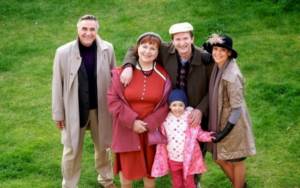
Ivan Budko - Fyodor Dobronravov A simple working man over 50 years old, a mechanic and driver of a bakery. Lives in the village of Kuchugury with his wife Valyukha. The adult daughter, along with her husband and child, has been living in the city for a long time. An optimist and joker, a source of folk humor, which may seem rude if you do not know Ivan’s kind and broad nature. He believes that without him, not a single thing will be done correctly; he can endlessly give advice. He respects a good feast, but can also hastily knock back a glass with a bosom friend. He always finds something to do and have fun, even after retirement he comes up with business projects of varying degrees of success. He considers city matchmakers to be intellectuals unadapted to life, which he never misses an opportunity to remind. In fact, he loves the whole family and especially his granddaughter, he takes care of everyone, although in a peculiar manner.
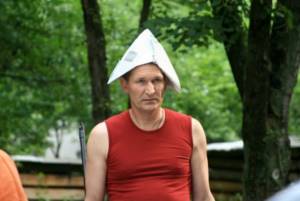
Valentina Budko - Tatyana Kravchenko Junior technologist at the bakery where her husband Ivan works. A real housewife, she cooks deliciously, the house is always clean. He constantly turns out to be the object of Ivan’s ridicule, but he doesn’t let him down - he will always find something to answer. A sharp-tongued, stubborn, determined, passionate nature, but kind-hearted and hospitable, unless, of course, it was Mityai’s neighbor who came to have a drink with her husband. He worries about his adult daughter living in the city and loves his granddaughter. He is afraid of high technology, preferring to deal with simple things that have passed many years of everyday tests. In retirement, she started a business - growing vegetables in greenhouses for sale. She didn’t immediately find a common language with the city matchmakers, but then the sophisticated Olga Nikolaevna became her best friend.
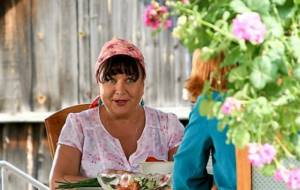
Olga Nikolaevna Kovaleva, Kotya - Lyudmila Artemyeva Lives in the city, works as a chief accountant at the institute. The adult son is married to the daughter of Ivan and Valentina Budko. A stylish business woman with a higher financial education, a leader by nature, which also manifests itself in family life - she rules over her beloved professor husband. I’m used to being in control of everything and solving problems on my own. She is smart and quite sarcastic, capable of sensitively “pricking” her opponent in a dispute. She always looks great, maintains an active lifestyle and a healthy diet. She is trying to instill her views on life not only in her little granddaughter, but also in her matchmakers. For a long time he has been in conflict with Ivan Budko over the right to leadership and does not understand Valentina, who, with her complexion, does not monitor her diet at all.
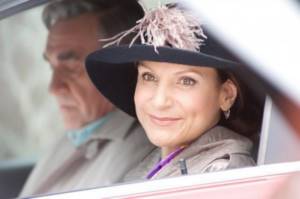
Yuri Anatolyevich Kovalev, Zaya - Anatoly Vasiliev Olga's husband, about 60 years old, professor of philosophy, teaches at the university. He gave his wife the reins of power in the family, he tries not to contradict, however, he can defend his personal interests quite harshly. Protects and protects Olga even if she goes too far. A kind, intelligent, gallant man, who sometimes turns out to be too detached from reality - the world of hypotheses and theoretical knowledge is closer to him than harsh everyday life. He is involved in sports and self-education, knows classical literature and history well, and thanks to his extensive knowledge, he is able to stupefy his opponent in an argument. He treats matchmakers as a philosophical problem that needs to be carefully thought about before solving.

Mityai - Nikolai Dobrynin A local rural drinker, familiar to every resident. A kind, but weak-willed person. Just like his godfather and friend Ivan Budko, a joker and inventor, always finds entertainment besides drinking and tries to drag those around him into it. Over time, he finds his love and starts drinking a bottle, however, Mityai’s restless character does not allow him or his young wife to get bored.
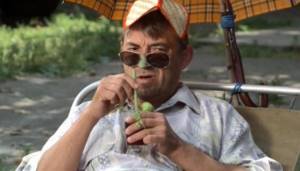
Zhenya - Ulyana Ivashchenko (season 1, 2), Sofya Stetsenko (season 3, 4) Anna Koshmal (season 5).
An ordinary girl growing up into an ordinary teenager with her own problems. Learns English, loves gadgets, dreams of becoming president as a child. With age, tastes and desires change, conflicts arise with parents and grandparents, but the strong loving family of the Budko-Kovalevs will overcome Zhenya’s passion for gothic culture, three guitars, company and much more...
Preparing for matchmaking
When the groom's parents found out that their son was getting married, they tried to find out as much as possible about his chosen one. During inquiries, they were interested not only in the reputation of the girl herself, but also of her relatives. We learned about the family's financial situation. It has long been believed that a bride is taken not for an individual guy, but for the whole family. And this means that she must become a worthy member of the family. After this, matchmakers were sent - these are a kind of intermediaries between the two families. The girl’s family, in turn, prepared a dowry - property with which the young wife would go to her husband’s house. This could be bed linen, shirts, household items, jewelry. It was accumulated from the birth of the girl and was her property even after marriage. If we were talking about merchant families, then the dowry included money. Among the nobles, real estate was often attached to the girl.
Individual status
- A bachelor
is a man who is not married, an unmarried man.
A bobyl
is usually the youngest child in a family who remains single to look after his parents and run their family trade. In addition, in the 15th-18th centuries, bobyls were the name given to bankrupt peasants who were unable to bear state duties - see Bobyl.
,
girl
, Also
Bachelorette
- a woman who has not married. The term "maiden" (obsolete) indicates the chastity of the girl.
- An old maid
,
a bobyliha
is a woman who has never been married, whose marriage is not expected due to her age or personal characteristics.
- a man who has divorced and has not remarried.
- a woman who has divorced and has not remarried.
- a man who did not marry after the death of his wife.
- A straw widower
is a man who lives separately from his wife for a long time for a reason that depends on her.
- a woman who did not marry after the death of her husband.
- A straw widow
is a woman who lives separately from her husband for a long time for a reason that depends on him.
is a woman whose husband is a soldier.
is an unmarried woman raising one or more children.
is an unmarried man raising one or more children.
- a child whose parent has died.
- An orphan
is a child whose both parents have died.
is a child of unknown parents, abandoned to strangers.
is a child abandoned by unknown parents and found by strangers.
is a step-child who, secretly from their parents, was replaced in infancy by their natural child.
Who acted as matchmakers
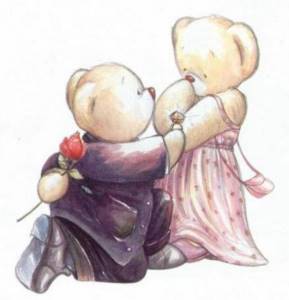
Matchmakers are the people who negotiated. This had to be done delicately. Direct speech was avoided; all statements were in the form of allegories. The bride's parents could be against the marriage. In this case, the matchmakers had to present strong arguments in favor of the groom, but not persuade - this was considered a bad omen. In ancient times, they sent elders - wise and respected people. In some areas, priests did the matchmaking. But often the delegation included the groom’s parents, godfather, professional matchmaker or matchmaker (in Russia, men were more likely to do matchmaking, but in Ukraine and Belarus women performed this role), and other relatives could also participate. All participants in the procession had to be family people. And their marriage is strong and happy.
Signs accompanying the matchmaking ceremony
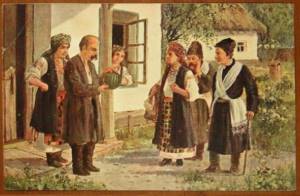
Now you know who matchmakers are. There are a lot of signs associated with matchmaking, here are some of them:
- Thursday was considered the luckiest day. And on Wednesday and Friday it was not customary to get married. The reason is that these days are fast (Judas sold Christ on Wednesday, and the crucifixion took place on Friday). If you look at it rationally, then these days there is simply nothing to treat those who come. And the ethical side was of great importance for our ancestors;
- We went to matchmaking in the evening. In order to avoid the evil eye. There is a more rational explanation: if the matchmakers want to keep it secret, for example, in case of refusal - there are fewer people in the evening, therefore, there is less chance of being noticed;
- Before leaving the house, the matchmaker places his hands on the stove. Such an action was supposed to guarantee a successful outcome of the matchmaking;
- on the way to the bride's house, the matchmakers were forbidden to talk;
- the only person you met who brought good luck was considered to be a maiden carrying clean water;
- it was necessary to bolt the doors as soon as the matchmakers entered the house. This was done in order to avoid uninvited guests;
- Having entered the house, the matchmaker or the groom's father knocked on the threshold three times with his left heel. At the same time, the words were said: “They are silent (it was said about the ancestors - the guardians of the clan), and you are silent, do not say a word against them”;
- the matchmakers did not take off their hats until they were invited to the table;
- one of the matchmakers had to manage to steal a spoon from the bride's parents. This ensured the future husband's leadership in the family. And the wife had to be faithful and obedient. Three months after the wedding, the spoon had to be secretly returned;
- if a girl is being wooed for the first time, it was advised to cover your tracks, saying: “A hundred suitors will follow your trail to me”;
- You can only get married until the end of April. Matchmaking and weddings in May are a bad omen. This promises the newlyweds a family life filled with scandals;
- If the bride's parents and the matchmakers came to an agreement, then after the guests left, the young mother tied the poker and grip together.
Matchmaker and Matchmaker
Matchmaker and Matchmaker
Matchmaking is one of the wedding customs. It has many mandatory and desirable elements, each with its own meaning. Rituals: Before the wedding, the groom's parents come to visit the bride's relatives. The future groom is required to receive a blessing from the bride's parents. Previously, matchmakers took the groom's relatives, but now the groom is an obligatory participant in the matchmaking, with which the wedding begins. The matchmaking of the bride occurs only with her consent. The bride must be prepared for matchmaking and prepare her parents. You need to discuss the day and time of the visit in advance. The future son-in-law should not be late for matchmaking, so as not to worsen the relationship with the future parents of his bride. It is worth arriving on time; being late on such an important day is a bad example. When the groom goes to match the bride, he must be beautifully dressed. In this way he shows his intentions. The bride must tell her chosen one in advance how to address her parents, and the names of the future relatives who will be present at the celebration. Favorable days: It was believed that on Wednesday and Friday it was undesirable to prepare for the wedding and matchmaking; these days were considered unfavorable for marriage . They made sure that the wedding did not fall on the 13th. At the same time, odd numbers such as the 3rd, 5th, 7th were considered lucky in matchmaking and weddings. At the same time, there were also actions that meant refusal - for example, if the groom’s parents did not like the bride, then they did not bother themselves , but simply put a pumpkin on the matchmakers - and thus made it clear that the groom was not suitable for them. Or, on the contrary, when the parents agree, they let them into the house, and after that they decide on the wedding date and the date of the wedding. The bride is shown to the matchmakers so that they can evaluate her. Then he gradually prepares for the wedding preparations. In turn, the groom's parents look closely at the bride's parents, because by marrying their children, they have acquired new relatives. According to tradition, a bride ransom takes place. The ransom takes place in a very humorous manner. This tradition as a ransom is of great importance, indicating that it really needs to be earned. When the groom has already bought his bride, they stand together in front of the bride's parents so that they give their blessing. And after the blessing, they go to the registry office for the wedding. In order not to quarrel in the future and live happily, it is necessary that the bride, entering her husband’s house, breaks a plate. Then she and her husband must step over the fragments. Most newlyweds listen to such signs. In order for the marriage to be long, happy and strong.
Matchmaking ritual
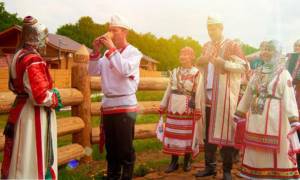
Usually matchmakers were sent several times. At the first meeting, it was customary to refuse, even if the bride’s family agreed to the marriage. It was considered bad manners to give away the girl the first time. In addition, the delay provided an opportunity to learn more about the groom’s relatives, if the families did not know each other before. They also believed that after the first groom one could expect another, more profitable one. The first matchmaking was formal. The groom's parents may not have taken part in it. When the matchmakers met for the second time, it was customary to set a rich table. Candles were lit in the house and lamps were placed near the icons. The groom's parents were always present, and sometimes he himself. If the bride was present at the matchmaking, she was seated separately from the intended husband. Negotiations were conducted with the girl's father. The girl's opinion was not asked. It was believed that such issues should be resolved by parents wise with life experience. It also happened differently, it depended on the way of life of the individual family.

If the matchmakers received a positive response, preparations for the wedding began immediately. The wedding date was chosen. The families discussed how each party would contribute to the organization of the long-awaited event. The issue of ransom was resolved. It could be clothing, a valuable item or money. In this situation, it was customary to bargain. When everything was decided, the bride's relatives lit a candle and, together with representatives of the newlywed, held a service. This was how the agreement on the alliance was sealed.

